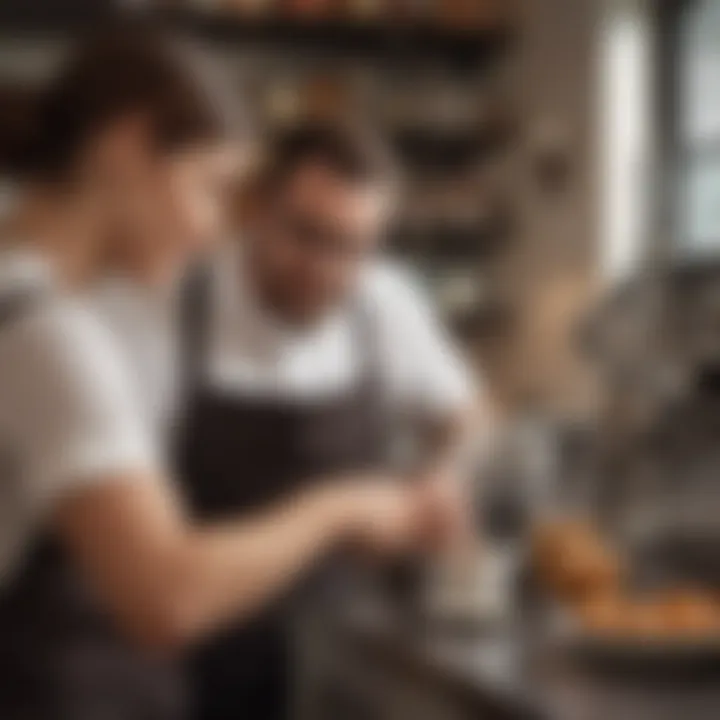Discovering the Best Local Coffee Shops


Intro
Finding the best coffee nearby is about more than just a quick caffeine fix. It’s an exploration of flavors, culture, and community. Each cup holds stories, processes, and care that make coffee an art rather than a mere commodity. To appreciate this beverage fully, one must understand various aspects, such as the quality of the beans, the brewing methods, and the practices that local coffee shops employ.
This guide will navigate your journey into coffee appreciation. You will learn not only how to find exceptional coffee in your area but also how to engage deeper with the experience. We will investigate the factors influencing coffee selection, including local culture and sustainability practices. By examining these elements, we hope to elevate your coffee-drinking experience while fostering a respect for the craft involved.
Through the lens of local baristas and various brewing techniques, we will aim to give you practical insights. This guide bridges the gap between simply drinking coffee and becoming an informed enthusiast. With each section, expect to dive into the rich tapestry of coffee culture, gaining insights that will transform your everyday coffee rituals.
Foreword to Local Coffee Culture
The cultural significance of coffee is deeply rooted in communities around the globe. Understanding local coffee culture is vital for anyone looking to explore the richness of their surroundings. Each region brings its unique flavors, brewing techniques, and social interactions that enhance the coffee experience.
In this article, we will examine how local coffee cultures affect the selection of coffee shops and beverages. Recognizing these distinctions allows consumers to appreciate their coffee choices more fully. This deeper understanding also highlights the importance of supporting local businesses and fostering community ties.
Understanding Regional Differences
Regional differences in coffee culture are shaped by factors such as climate, geography, and traditions. For example, in countries like Ethiopia, coffee is not just a drink but a ceremony that holds cultural significance. The preparation of coffee involves an elaborate ritual that reflects the community's values.
In contrast, coffee in Italy is often associated with specific drinking habits, such as espresso consumed standing at the bar. Each locale celebrates coffee in its own way, which reveals the interplay between beverage and identity.
Additionally, local preferences are influenced by what is easily available. Regions known for coffee farming may have a wider range of specialty brews. In comparison, urban areas may focus on artisanal coffee shops that emphasize innovative blends and brewing methods. It’s essemtial to explore these variances to gain insight into personal preferences when selecting coffee.
The Importance of Community in Coffee Shops
Coffee shops serve as gathering spaces, fostering relationships among people. The role of community in coffee culture cannot be understated. These venues often host events, promoting local artists and artisans, and offering patrons a sense of belonging. Engaging with others over a shared love for coffee strengthens social bonds.
Moreover, local coffee shops prioritize customer relationships. Baristas often know regular customers, creating a welcoming environment. This personal connection enhances the coffee-drinking experience and encourages patrons to return.
Supporting local coffee shops not only benefits the economy but also helps maintain cultural traditions that may otherwise be lost in a fast-paced, globalized world. Community-driven coffee culture is vital for keeping traditions alive and ensuring that coffee remains a vehicle for social interaction.
"Coffee is a language in itself, spoken in unique dialects across regions, each blending a story with every cup."
Exploring local coffee culture means understanding how these various elements come together, creating a vibrant tapestry of flavors, traditions, and connections.
Criteria for Selecting the Best Coffee Shops
Selecting the right coffee shop is crucial for a satisfactory coffee experience. It goes beyond just grabbing a cup of caffeinated beverage. Understanding the criteria that define the best coffee shops can significantly enhance one's appreciation of coffee culture. Focusing on quality, skill, and atmosphere, among other factors, leads to a holistic understanding of what a shop offers. Here we delve into these key elements to ensure your coffee adventure is enjoyable and fulfilling.
Quality of Coffee Beans
The foundation of any great cup of coffee is the quality of the beans used. Not all coffee beans are created equal. The choice between Arabica and Robusta should be understood well. Arabica beans often offer smoother and more flavorful coffee, while Robusta tends to have a stronger and more bitter profile. Only the freshest, highest quality beans should be sourced, ensuring the best taste in each cup.
Some coffee shops pride themselves on sourcing beans from specific regions known for their unique flavor profiles. For instance, Ethiopian coffee is often noted for its fruity and floral aspects due to the ideal growing conditions in that region. Meanwhile, Colombian coffee is typically recognized for its balanced flavor. These distinctions can greatly affect the overall coffee experience.
Regularly checking for certifications such as Fair Trade or Rainforest Alliance can also indicate a shop's commitment to quality and ethical sourcing. When a coffee shop prioritizes high-quality beans, it reflects a dedication to providing an excellent beverage for its customers.
Skill of Baristas
The expertise and artistry of baristas play an essential role in how coffee is prepared and served. A skilled barista not only knows how to brew coffee but understands the nuances involved in extracting the best flavors from different beans. Their proficiency in operating espresso machines and other brewing apparatus is vital.
Moreover, conversation with baristas can be enlightening. They often possess substantial knowledge about coffee varieties, brewing methods, and flavor notes. Engaging with them can transform a simple purchase into an informative experience. For instance, a good barista can explain why a specific brew method might be chosen for a certain type of coffee. This dialogue enhances consumer understanding of coffee, generating a more profound appreciation.
Atmosphere and Ambience
The physical environment of a coffee shop influences the entire experience. A comfortable, inviting atmosphere can encourage customers to linger and enjoy their drink instead of just rushing out. Elements such as lighting, seating arrangements, and overall decor contribute significantly.
Good coffee shops often create spaces that facilitate not just drinking coffee but also social interaction and relaxation. Cozy nooks for reading, communal tables for group conversations, and even quiet spaces for those wanting to work on projects invite customers to spend more time. Ultimately, the ambience should harmonize with the coffee being served, creating a memorable and enjoyable visit.
These criteria for selecting the best coffee shops underline their importance as community and culture hubs. Finding establishments that excel in these areas will certainly lead to an enriched coffee experience.
"A great coffee shop isn't just about the coffee. It's about the entire experience, from bean quality to the barista's skill and the surroundings we enjoy them in."
Exploring options with these considerations will guide you in discovering the finest coffee nearby.
Exploring Brewing Methods
Brewing methods can profoundly affect the flavor and aroma of coffee. Understanding these different techniques is a crucial step in enhancing one’s coffee experience. Each method brings unique characteristics, extracting various elements from roasted coffee beans. Through this exploration, coffee lovers can better appreciate the craft behind their favorite beverages. Selecting the right brewing technique influences not only the taste but also the entire coffee ritual. It invites exploration and experimentation.
Espresso and its Variations


Espresso forms the foundation for many popular coffee drinks. It is brewed by forcing hot water through finely ground coffee at high pressure. This method results in a concentrated shot of coffee, rich in flavor and texture. Variations such as Americano, cappuccino, and latte stem from this basic preparation.
The artistry of crafting a perfect espresso requires skill and precision. The choice of coffee beans, the grind size, and the tamping pressure all affect the final product. Understanding these variables helps in making informed choices when ordering or preparing espresso-based drinks. A good espresso is not just a drink; it is an experience characterized by its crema, aroma, and intense flavor.
Pour Over Techniques
Pour over methods have gained popularity for their ability to control brewing variables. Methods like the Chemex or Hario V60 allow users to observe the brewing process closely. This hands-on approach leads to greater customization. Coffee aficionados often appreciate that pour over can highlight the distinct flavors of single origin beans.
The slow pouring allows for even saturation of the coffee grounds. This leads to an extraction that balances acidity and sweetness. Factors like water temperature, grind size, and pouring technique greatly impact the final cup. Engaging in this method invites coffee drinkers to develop their preferences and adjust them accordingly.
French Press vs. Cold Brew
Choosing between French press and cold brew often depends on personal taste and lifestyle. The French press, or press pot, immerses coarse coffee grounds in hot water. After steeping, the grounds are separated using a plunger. This method provides a rich, full-bodied cup with pronounced flavors. Coffee lovers often enjoy the tactile process of pressing their coffee, which adds an engaging element to brewing.
In contrast, cold brew employs a different process. Coarse coffee grounds steep in cold water over an extended period, typically 12 to 24 hours. The resulting beverage is less acidic and smoother, making it refreshing. It can be served over ice or mixed with milk and syrups.
Both methods offer distinct advantages and flavors. Choosing between them requires consideration of both taste and preparation time. Each brings unique sensations to the coffee drinking experience.
Understanding Coffee Types and Varieties
Understanding different coffee types and varieties is essential for anyone interested in enhancing their coffee experience. This knowledge not only helps in choosing the right brew but also enriches one's appreciation of coffee culture. Each variety brings unique flavors, aromas, and characteristics, making the coffee journey diverse.
Arabica vs. Robusta
Arabica and Robusta are the two most significant species of coffee. Arabica, known scientifically as Coffea arabica, tends to have a sweeter, more delicate flavor profile. It grows at higher altitudes; the beans are often smaller and more oval in shape. They possess a complex flavor, with hints of fruits, sugar, and even floral notes. Many coffee enthusiasts prefer Arabica for its smoothness and lack of bitterness.
On the other hand, Robusta, referred to as Coffea canephora, has a stronger and more bitter taste. The beans are rounder and larger, thriving in lower altitudes. Robusta coffee generally contains more caffeine, which contributes to its harsh taste. It is often used in espresso blends for added body and crema.
When selecting coffee, understanding whether the beans are Arabica or Robusta can guide you toward the taste experience you desire. Different preparation methods may alter how these varieties shine in your cup.
Single Origin vs. Blends
Single origin coffees come from a specific region, farm, or micro-lot. They showcase the unique flavor profile imparted by the local environment, climate, and soil conditions. Drinking single origin coffee can be an enlightening experience, as each cup reflects consistent qualities tied closely to its origin. Those seeking a genuine connection to their coffee will appreciate exploring different single origin options available.
Blends are composed of beans from various sources. Coffee roasters create blends to achieve balanced flavors that might not occur in single-origin coffees. A well-crafted blend can marry the strengths and weaknesses of its components, often leading to a fuller, more complex taste. This approach can cater to broader taste preferences and create a unique branded identity for coffee shops.
"The more we know about coffee, the more we can appreciate each sipping moment."
This knowledge enhances your coffee adventures, making you a better consumer and a more engaged member of the coffee community.
Engaging with Local Baristas
Engaging with local baristas serves as a gateway to a richer coffee experience. These individuals are not just servers; they are passionate professionals who often have a wealth of knowledge about the beverages they create and the beans they brew. When you take the time to interact with them, you can gain valuable insights into local coffee culture, production methods, and unique offerings that might not be found on the menu. This interaction enhances your appreciation of coffee by connecting you to its story and the community surrounding it.
Asking Questions About Coffee
Asking questions is one of the simplest yet most effective ways to engage with baristas. When you visit a coffee shop, don't hesitate to inquire about the origins of the coffee beans used. Local baristas often take pride in their sourcing practices, and they are keen to share the details. For instance, asking about the difference between Arabica and Robusta can lead to a deeper understanding of flavor profiles and quality. You might learn about the farmer who grew the beans and the environmental conditions that affected their harvest.
Additionally, questions about brewing techniques can yield fascinating information. Inquiring why a certain brewing method is preferred or what makes a particular roast stand out can provide insights into how these factors influence taste. Baristas enjoy sharing their passion, and engaging them with thoughtful questions can lead to an enlightening conversation.
Learning About Sourcing Practices
Understanding sourcing practices is essential in the modern coffee world. Many consumers today value ethically sourced coffee, and knowledgeable baristas can shed light on this topic. Ask them about the farms they partner with and the methods used to ensure sustainable farming. This information might include how the cooperative structures work or initiatives that support fair trade practices.
The impact of sourcing decisions extends beyond flavor; it affects local economies and the environment. Baristas can explain how certain practices conserve resources or support community development. When you learn about these elements, you not only enrich your coffee experience but also contribute to a greater purpose.
In summary, engaging with local baristas is vital to fully appreciating the nuances of your coffee experience. Questions lead to knowledge, and learning about sourcing practices emphasizes the importance of ethical considerations. The more you connect with baristas, the more you enhance your understanding and enjoyment of coffee.
Coffee Etiquette and Tasting
Understanding coffee etiquette and tasting is an essential part of enhancing the overall coffee experience. It shapes how one interacts with coffee, elevating both personal enjoyment and appreciation for this complex beverage. Learning the nuances of tasting coffee properly can bring to light subtleties that may otherwise be overlooked.
How to Taste Coffee Correctly
Tasting coffee is not simply about drinking it; it requires a focused approach. Follow these steps to taste coffee correctly:
- Select the right coffee: Choose a high-quality brew. Freshness and method of preparation matter.
- Observe the coffee: Look at the color and texture. Make note of the aroma, which is vital for appreciating flavor.
- Sip carefully: Take a small sip and let it cover your tongue. This helps in identifying the varied flavors.
- Analyze the taste: Consider the balance of acidity, sweetness, and bitterness. Each coffee has its own personality, shaped by origin, processing, and roast level.
- Reflect and compare: Think about your experience. How does it compare to others you have tasted?
The idea is to savor the coffee and appreciate its various dimensions rather than just consuming it.
Identifying Flavor Profiles


Identifying flavor profiles in coffee can greatly enhance your tasting experience. Coffee can present myriad flavors ranging from fruity to nutty or even chocolatey. Here is a brief list of common flavor profiles:
- Fruity: Often found in coffees from regions like Ethiopia, with notes of berries or citrus.
- Floral: Typically associated with coffees grown at high altitudes, such as some Colombians.
- Nutty: Common in Brazilian coffees, presenting flavors of hazelnut or almond.
- Chocolatey: Frequently occurs in medium to dark roasted coffees, enhancing richness.
It is beneficial to keep a flavor wheel handy while tasting. Referencing it may help in identifying the nuances of each cup.
"The ability to discern flavors in your coffee can elevate your enjoyment and understanding of this intricate beverage."
With practice, you will become more adept at identifying these flavors, transforming coffee tasting into a richer and more fulfilling experience.
Sustainability Practices in Coffee Sourcing
Sustainability is not just a trend; it’s becoming a necessary practice in various industries, including coffee. Many coffee lovers increasingly consider sustainability when selecting beans or choosing a café. This section aims to explore the various aspects of sustainability, focusing on ethical sourcing, environmental impact, and social responsibility.
Ethical Coffee Choices
Ethical coffee sourcing involves ensuring that coffee is produced in a manner that is fair to all parties involved: growers, workers, and the environment. Various certifications often signify commitment to ethical practices, such as Fair Trade, Rainforest Alliance, and UTZ. These certifying bodies set standards that farmers must adhere to, ensuring fair wages, safe working conditions, and environmentally friendly practices.
When purchasing coffee, look for these certifications on the packaging. Supporting ethically sourced coffee helps empower farmers and allows them to invest more in their communities, leading to better educational and health outcomes. Consumers play a crucial role as their purchasing decisions can create demand for products that prioritize ethics over profits.
Impact on Local Communities
Sustainability in coffee sourcing affects not just the environment but also the local communities that depend on coffee production. For many families in coffee-growing regions, coffee cultivation is the primary income source. Thus, sustainable practices can significantly enhance their quality of life.
By adopting sustainable farming methods, coffee growers can improve soil health, using less water and fewer chemicals. This not only preserves local ecosystems but also ensures better crop yields over time, benefitting communities economically.
Additionally, many sustainable initiatives promote community development. For example, some cooperatives reinvest profits into local infrastructure or education projects. This creates a positive feedback loop where the community thrives economically, leading to higher-quality coffee production.
Supporting sustainable coffee practices ultimately nourishes both the environment and the workforce that cultivates this beloved beverage.
The Role of Technology in Coffee Preparation
Technology has revolutionized the coffee preparation process in numerous ways, enhancing both the quality and efficiency of brewing. As coffee enthusiasts continue to seek the best flavors and experiences, advancements in technology play a crucial role in satisfying those demands. Understanding how technology functions in coffee preparation can deepen one's appreciation for the beverage. The integration of technology in coffee preparation helps to achieve a precise brewing experience that consistently delivers a desirable taste.
This section will examine two main aspects of technology in coffee preparation: coffee grinding innovations and smart coffee machines.
Coffee Grinding Innovations
Grinding coffee beans is an essential step in the preparation process. The grind size determines the extraction rate and ultimately influences the flavor profile of the coffee. Innovations in coffee grinders now allow for better consistency and precision.
Some of these advancements include:
- Precision Grinding: New grinders utilize advanced robotics and mechanics to achieve consistent grind sizes, ensuring that each batch of coffee is brewed with a reliable flavor profile.
- Adjustable Settings: Many recent models come equipped with adjustable settings, allowing users to customize the grind size according to brewing methods, such as espresso, pour-over, or French press.
- Grind Speed Control: Innovative grinders offer speed control features which help to reduce heat generated during the grinding process, preserving the beans’ essential oils and preventing flavor degradation.
"The grind size significantly impacts the brewing outcome; hence, upgrading to a modern grinder can transform your coffee experience."
Smart Coffee Machines
Smart coffee machines have transformed home brewing practices, incorporating features that enhance convenience and personalization. These devices allow for a level of control and customization hitherto unseen in household settings.
Noteworthy features include:
- App Connectivity: Many smart machines can connect to a smartphone app, allowing users to control brew strength, temperature, and even scheduling brew times remotely.
- Integrated Scales: Some models come with built-in scales to measure the coffee and water ratio accurately, ensuring a perfectly brewed cup every time.
- Automatic Maintenance Reminders: Smart machines often enable reminders for cleaning and maintenance, ensuring longevity and maximum efficiency by preventing buildup and clogs.
As these technologies continue to progress, they cater to the ever-evolving preferences of coffee lovers while fostering a deeper knowledge and connection to the craft of coffee preparation.
Networking within the Coffee Community
Networking within the coffee community is a pivotal aspect for those keen to deepen their appreciation of coffee. The connections formed can lead to increased knowledge and experiences that amplify one’s coffee journey. By engaging with like-minded individuals, coffee enthusiasts can share insights, tips, and recommendations about local spots that offer quality brews.
Benefits of Networking:
- Knowledge Sharing: Interacting with fellow coffee lovers can provide invaluable insight into brewing techniques and unique coffee varieties. These discussions often lead to discovering local favorites that may not be widely known.
- Event Participation: Networking helps in learning about upcoming events such as coffee tastings, workshops, and competitions. Attending these events enriches one's coffee knowledge and opens opportunities for hands-on experiences.
- Support for Local Businesses: Networking often means championing local coffee shops. Supporting these establishments goes beyond just buying coffee; it fosters community growth and sustainability.
Considerations for Effective Networking:
- Approach conversations with curiosity. Ask questions and share personal experiences related to coffee.
- Attend events regularly. The more often you participate, the more familiar faces you will encounter.
Networking in the coffee community is not just about making contacts; it's about forming friendships grounded in a shared passion for coffee.
Attending Coffee Festivals


Coffee festivals present a unique opportunity to immerse oneself in the vibrant coffee culture. These events showcase a variety of vendors, brands, and artisanal coffee makers, enabling attendees to sample diverse offerings in one place.
Additionally, festivals often feature workshops, tastings, and lectures that cover various aspects of coffee, from sustainable sourcing to brewing techniques. Such educational components can significantly enhance one’s appreciation and understanding of coffee.
Key Highlights of Coffee Festivals:
- Diverse Offerings: Explore various coffee origins and processing techniques in a single day.
- Meet the Experts: Network with baristas and roasters. Ask them questions that can deepen your understanding.
- Experience Trends: Festivals often showcase the latest flavors, blends, and brewing methods in the coffee world.
Joining Local Coffee Groups
Becoming part of local coffee groups can be highly beneficial for any coffee lover looking to expand their knowledge and social circle. These groups often meet regularly, allowing members to discuss different coffee-related topics, organize tastings, or even visit local coffee shops together.
Joining such groups doesn’t just improve your coffee palate; it also solidifies your connection to local roasters and coffee shop owners.
Benefits of Joining Coffee Groups:
- Community Engagement: Build friendships with those who share the same passion, enhancing social interactions.
- Access to Resources: Members often share resources like books, articles, and tools that can further one’s coffee journey.
- Special Events: Many groups organize events like cuppings or brewing competitions that allow members to practice and refine their skills.
Spotlight on Noteworthy Coffee Shops
Highlighting remarkable coffee shops is essential to understanding the local coffee landscape. These shops often embody the spirit and culture of their communities. They are not mere purveyors of coffee but are spaces where people gather, connect, and share experiences. This section will explore well-deserving coffee spots in various locales, shedding light on what makes them noteworthy.
Making a Case for Local Favorites
Local coffee shops often serve as the heartbeat of a neighborhood. They provide not only high-quality coffee but also an atmosphere that encourages community engagement. Supporting local businesses helps to strengthen the local economy and fosters relationships between patrons and baristas.
When assessing local favorites, consider their unique offerings. These could include:
- Specialty Drinks: Unique blends or signature beverages created by the shop.
- Community Involvement: Involvement in local events or partnerships with other local businesses.
- Loyal Customer Base: A strong, returning clientele is often a key indicator of a shop’s quality.
In many cases, the stories behind these local shops reveal much about their character. Engaging with the owners or tasting their specials may also provide insights into their coffee journey and sourcing practices.
Innovative Concepts in Coffee Shops
Innovation in coffee shops goes beyond just serving coffee. Many establishments are now integrating technology and design to enhance the consumer experience. Some notable concepts include:
- Coffee and Co-Working Spaces: Combining café culture with co-working areas allows for a productive environment while enjoying good coffee.
- Sustainable Practices: Shops that focus on ethical sourcing, reusable materials, and eco-friendly products. This approach appeals to environmentally conscious consumers.
- Unique Brewing Methods: These include or providing a range of brewing styles, such as nitrogen-infused coffee or rapid coffee brewing technology.
The coffee landscape is continually evolving. Noteworthy coffee shops are not afraid to push boundaries and set trends while still maintaining quality and connection with their customers.
"Great coffee shouldn't just be about taste; it's about the experience and the stories that come with every cup."
The Future of Coffee Consumption
The coffee industry is at a pivotal juncture. As the third wave of coffee continues to reshape how coffee is perceived and consumed, understanding the future of coffee consumption is more relevant than ever. This section outlines emerging trends that are likely to influence not only how coffee is brewed and served, but also how it impacts social behaviors and sustainability practices. The future of coffee drinking is not just about taste; it's also intertwined with innovation and ethical considerations.
Emerging Trends in Coffee Drinking
In recent years, several trends have begun to dominate the coffee landscape. Specialty coffee shops are seeing a rise in consumer interest as more people seek unique flavors and experiences. This shift is pushing cafes to explore various approaches to coffee preparation and presentation. Among the notable trends are:
- Plant-Based Alternatives: As dietary preferences shift, the demand for vegan and dairy-free options has increased. Oat milk, almond milk, and soy milk are becoming staples, appealing to a wide range of consumers.
- Cold Brew Popularity: Cold brew coffee is no longer just a summertime trend. Its smooth flavor profile and low acidity are appealing to those who prefer a gentler coffee experience year-round.
- Nitro Coffee: The infusion of nitrogen into coffee creates a creamy texture without the use of milk. This trend has gathered traction, especially among younger coffee drinkers.
- Sustainability Focus: Consumers are increasingly concerned about the environment. This concern is leading to a demand for sustainably sourced beans and eco-friendly packaging.
These emerging trends are shaping the way cafés and roasters develop their offerings, making it crucial for businesses to adapt.
Shifts in Consumer Preferences
Consumer behaviors are evolving. Today's coffee drinkers are more informed and conscientious. They are seeking quality over quantity, which has profound implications for producers and retailers alike. Key shifts include:
- Informed Choices: More consumers are taking the time to understand where their coffee comes from. They seek transparency in sourcing practices and often opt for fair-trade products that promote ethical farming practices.
- Health-Conscious Decisions: The focus on health is reflecting in coffee choices. Many consumers are gravitating towards lighter roasted coffees that retain more of the natural antioxidants, or choosing specialty brews that are lower in calories.
- Experience Over Convenience: The rise of coffee culture is shifting priorities. Rather than just grabbing a cup on the go, many people prefer to sit down and savor their brew in a local café. This is leading to a rise in establishments that offer not just coffee, but an immersive experience.
"As trends fluctuate, it is essential for coffee shops to stay attuned to consumer preferences. This adaptability will be the key factor in thriving in a competitive market."
Closure: Defining Your Coffee Experience
The conclusion of an article on coffee is not simply an end; it is a vital moment where all previously discussed elements converge. Personal coffee experiences shape how one perceives and enjoys this beverage. With the right understanding of local culture, quality coffee, and evolving trends in preparation, a reader can truly refine their coffee journey. This introspection is not just about flavor but connects to sustainability aspects and the community surrounding coffee.
Reflecting on Personal Preferences
Personal preference is paramount in coffee enjoyment. Each coffee drinker has unique tastes influenced by many factors such as geography, culture, and individual palate. Engaging with various coffee blends and brewing methods allows individuals to discover what resonates most with them. Reflect on how you feel about various types of coffee, from dark roasts to light brews.
Consider keeping a coffee journal. Write down your tasting notes, including flavors you identify and your emotional reactions to them. This activity can help you identify patterns in your taste preferences, letting you understand better what types of coffee you favor. Furthermore, discussing your opinions with local baristas can provide insights into what makes each coffee unique and can guide your exploration.
Encouraging Ongoing Exploration
Coffee is not stagnant. It evolves with trends, methods, and personal insights. As a coffee lover, the journey should be ongoing. Visiting diverse coffee shops, experimenting with new brewing techniques, and tasting different origins can deepen your appreciation.
To enhance your coffee knowledge:
- Attend local coffee tastings or workshops.
- Join forums or groups, such as those found on Reddit, where you can exchange ideas and experiences with fellow enthusiasts.
- Explore coffee festivals or events to broaden your horizon on what coffee can be.
Ultimately, ongoing exploration fosters a richer coffee experience. Engaging actively with new ideas and practices can instill a deeper understanding and love for coffee, ensuring each cup is not just a drink but a cherished moment in your daily life.



